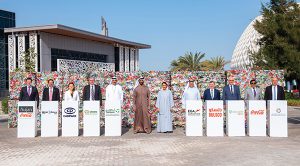Abu Dhabi / WAM
Emirates Global Aluminium (EGA), the largest industrial company in the United Arab Emirates outside oil and gas, and leading beverage producers, can-makers and waste management companies, on Sunday announced the launch of the “Aluminium Recycling Coalition”, which aims to drive a step-change in aluminium recycling in the UAE.
The coalition was launched at EGA in Al Taweelah in presence of Abdullah bin Touq Al Marri, Minister of Economy, and Mariam bint Mohammed Almheiri, Minister of Climate Change and the Environment.
Members of the coalition include EGA, Abu Dhabi Waste Management Company (Tadweer), Aujan Coca-Cola Beverages Company, Coca-Cola Al Ahlia Beverages Company, Beeah Tandeef, Pepsi bottler Dubai Refreshment, CANPACK, Crown Bevcan EMEA, Dulsco Group and Veolia.
The Aluminium Recycling Coalition aims to promote aluminium recycling by UAE consumers, particularly beverage cans – as millions of individual decisions every day on which bin to use drive collection rates.
As its first project, the coalition intends to support a study by the International Aluminium Institute on aluminium recycling rates and behaviours in the UAE, to fully understand the scale of the opportunity and potential solutions. The International Aluminium Institute is the global trade association for the aluminium industry, and is conducting similar studies around the world.
The coalition also expects to provide support to government on aluminium recycling regulation and policies, and to work together to further the development of aluminium recycling infrastructure.
Minister Al Marri said, “The Aluminium Recycling Coalition is led by Emirates Global Aluminium, the biggest ‘premium aluminium’ producer in the world and the heart of the broader aluminium sector in the UAE which generates over $5 billion annually in the national economy. It will enhance the UAE’s position as a global leader in international efforts towards green development, support our 2031 goals on the circular economy, and contribute to building a knowledge-based economy that is more resilient and competitive.â€
Almheiri stated, “Aluminium demand is expected to grow worldwide by between 50 percent and 80 percent by 2050, because of the key role of this infinitely recyclable material in achieving net zero. Cooperation throughout the value chain, such as the Aluminium Recycling Coalition, will speed the decarbonisation of our economy in line with the Net Zero by 2050 Strategic Initiative. I wish EGA and the other members of the Aluminium Recycling Coalition every success in their collective endeavour.â€
Ali Al Dhaheri, Chief Executive Officer of Abu Dhabi Waste Management Centre (Tadweer), noted, “We are delighted to be a partner of the Aluminium Recycling Coalition founded by EGA, and are excited to usher in the next era of aluminium recycling in the UAE through concentrated efforts. Recycling and circular economy are both key pillars of our country’s ambition towards prosperity. For us at Tadweer, this is also part of our commitment to support national platforms that support sustainability and raise awareness on the importance of recycling in the UAE.â€
For his part, Abdulnasser Bin Kalban, Chief Executive Officer of EGA, commented, “Recyclability is one reason aluminium is so important for human progress, but every day as a society we throw too much of this valuable metal away. By championing the Aluminium Recycling Coalition, EGA aims to increase aluminium recycling rates in the UAE to the benefit of our society and economy. I thank all our partners for joining us in this initiative.â€
EGA was the first Middle East headquartered company to join the Aluminium Stewardship Initiative, a global body that sets sustainability standards for the industry. EGA is a global aluminium industry leader in the re-use of by-products from its own operations.
Last year, EGA announced a project to build the UAE’s largest aluminium recycling facility.
Aluminium plays an essential role in the development of a more sustainable society. The metal’s properties are ideal to make everything from packaging to lightweight electric vehicles, and aluminium is infinitely-recyclable.
Around the world, aluminium is the most-recycled material, with more than three-quarters of the aluminium ever made still in use today.
 The Gulf Time Newspaper One of the finest business newspapers in the UAE brought to you by our professional writers and editors.
The Gulf Time Newspaper One of the finest business newspapers in the UAE brought to you by our professional writers and editors.
